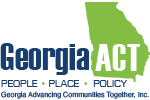Who represents me?
Go to the Open States website (www.openstates.org) or free iPhone app and enter your home address to identify your state Senator and State Representative and link to their information and how to contact them.
What is happening at the Georgia General Assembly?
The website of the Georgia General Assembly (www.legis.ga.gov) has tremendous resources:
- Locate your legislator and get their picture and bio;
- Contact info for all legislators (office, phone, fax and email);
- Get a Bill (searching either by Bill number or subject matter) and see different versions of the Bill, who the sponsors are, what committees it was assigned to, the votes that were cast on the House and Senate floor, and the current status of the legislation;
- Study Committee Reports;
- Review Committee schedules, agendas and hearing notices;
- Watch House and Senate floor debates and some Committee meetings (live or archived);
- Budget documents and analyses;
- Links to other state government websites;
- Current Georgia Code.
Many Ways to Take Effective Action:
- Contact legislators before, during and after the legislative session.
- Speak to your colleagues, family and friends to engage them on the issue.
- Come to the capitol when Lobby Day opportunities arise and bring others.
- Work with Caucuses i.e., Rural Caucus, Working Families Caucus, Women’s Caucus, etc.
- Identify/build relationships with legislative leadership, Governor, Lt. Gov., etc.
- Connect and collaborate with groups that share your priorities to build support.
- Get the word out on TV, radio and social media by cultivating reporters, writing op‐eds and letters to the editor, and using U‐Tube, blogs, tweets and Facebook.
- Become a grassroots activist by engaging with a campaign to elect people who support your priorities, registering people to vote, helping with “get out the vote” efforts, and becoming involved with other community activists.
